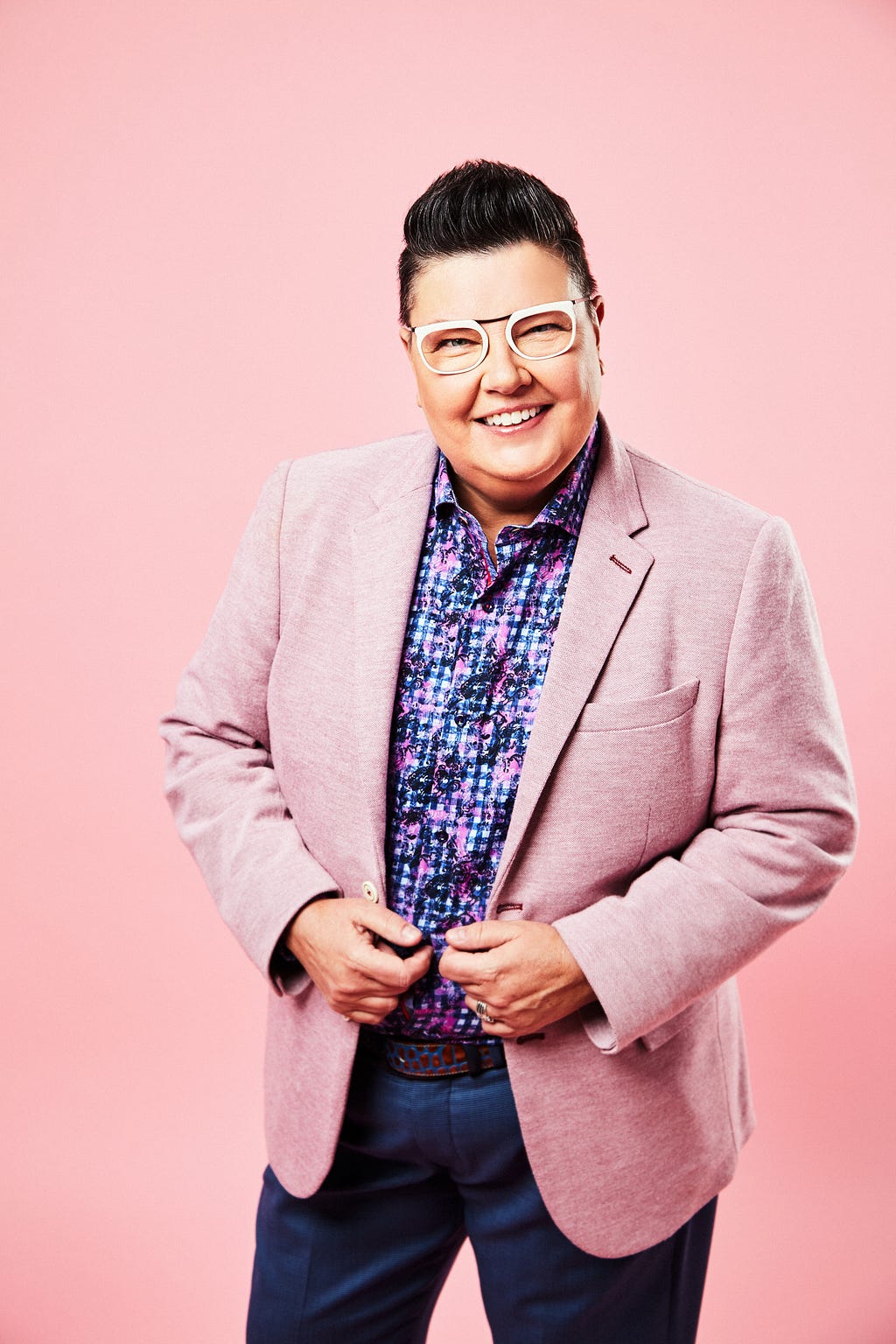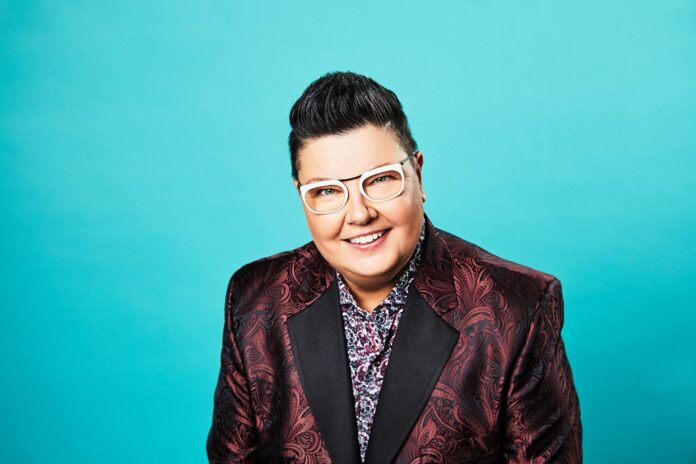An Interview With Vanessa Ogle
…Commit to effective allyship. Recognize and own your privilege and use that to support marginalized groups. Always try to be better by educating yourself constantly and taking action. Speak out on injustices when you see them…
In a world where diversity is often acknowledged but not always celebrated, we are taking a step forward to highlight the importance of inclusivity in building strong, vibrant communities. This series aims to explore the various facets of diversity — be it racial, cultural, gender-based, or within the differently-abled community — and understand how embracing these differences strengthens our social fabric. As part of this series, we had the pleasure of interviewing Layne.
Layne is an extraordinary force on a mission to create a more inclusive, accepting, and compassionate world. With captivating speeches delivered with unwavering authenticity, they advocate for empathy and unity, leaving a lasting impact. An advocate for social impact, their work as The Auctionista has raised over $40 million for charity. They champion the idea that no challenge is insurmountable, and no dream is unattainable. Layne would know best. Prior to becoming Canada’s Top Fundraising Auctioneer and creating a powerhouse company, Layne successfully pivoted from working as a Financial Advisor to Director of Development at an Ontario-based charity. Through their determination and perseverance, they decided to take the leap and reinvent the role of auctioneer. Now, Layne is one of the most coveted and respected auctioneers and keynote speakers in the fundraising space, with a sparkling reputation for personal storytelling that connects. Layne is continually moving the dial on philanthropy and making communities across the globe stronger. Layne’s unique blend of passion, authenticity, and unwavering dedication sets them apart as a catalyst for positive change, inspiring others to join them on their journey toward a more accepting and compassionate future, where success has no barriers.
Thank you so much for joining us in this interview series. Before we dive into our discussion about celebrating diversity, our readers would love to “get to know you” a bit better. Can you share with us the backstory about what brought you to your specific career path?
Throughout my career as The Auctionista, my gender identity and gender expression have evolved. I am gender fluid. In my professional career, both on and off stage, I have experienced discrimination, inequities, and challenges. At various times, this affected my mental health, my physical well-being and productivity. I believe we are all deserving and entitled to live our best lives and openly express who we are.
As someone who identifies as non-binary, and is now authentically comfortable in their skin, proud, a successful entrepreneur, and performer, LGBTQ2S+ folks and the public see me as a positive influence and visible representation. These communities started to approach me for advice, invited me to guest on their podcasts and other speaking opportunities.
From there, word spread, and I was invited to speak at larger events and conferences. It grew beyond 2SLGBTQ2S+ events to general audiences that were eager to hear about my personal life, the good and the difficult. It was then that I realized it was time to take my voice “beyond the ballroom” as The Auctionista. The time was right to share my voice for education, motivation, and positively impact audiences to live their best lives.
Beyond keynote speaking, I began to see there was a hunger from individuals, businesses, and non-profit organizations to deepen their understanding of gender diversity.
The IMPACT workshop was born from that desire to help create inclusive and diverse workplaces. “We can all do better.”
Can you share an interesting or hopeful story where spending time with someone who did not look like you or who was different from you taught you something that has been useful to you?
I recently attended Cliff Cardinal’s play ‘The Land Acknowledgement, or As You Like It’
A solo show, Cardinal examines the relationship between the Indigenous community and the settlers. Whether it’s the painful truth of the state of the reconciliation process in our country or his opening remark along the lines of “At the end of this show, I will be taking the deed to your home and you will leave”.
He unabashedly challenges the audience to pay attention to someone other than our own selves. It was uncomfortable. It was raw, real and it forced the audience to reflect on their privilege. It profoundly affected me. I considered myself one who takes action and strives for equality and justice and recognizes my privilege. I realized I have more work to do.
You are a successful leader. Which three-character traits do you think were most instrumental to your success? Can you please share a story or example for each?
Positive mental attitude — Consciously and intentionally believe that what you see, you can be.
Courage — the courage to keep being authentically yourself. To not bend to societal expectations.
Vulnerability — acknowledging one’s mistakes, sharing dark/difficult moments/experiences so that others know they are not alone.
Ok, thank you for that. Let’s now jump to the primary focus of our interview. Can you share a personal story that highlights the impact of diversity and inclusivity in your life or career?
Several years ago, I was conducting a live auction, and my world came crashing down on me in a way that I had never experienced. I noticed a pre-teen sitting with their parent, raising their hand to bid in the auction. I loved what I saw and decided to approach the youth and engage them further.
I turned to them and said, “Hello young man! Are you bidding for yourself or your parent?”.
The youth turned to me and said- I AM NOT A MAN.
I had publicly misgendered this youth.
For me, this was beyond just an error in judgment. After educating and correcting people/voice for justice in my personal and professional world about the correct use of pronouns, not assuming pronouns and gender, I had made the error. I struggled with this and gave myself grace to process and in the end. I understand that I am human. And I will make mistakes. From that moment forward I committed to doing better. I pause before I speak.
How do you approach and manage the challenges that arise when working towards creating more inclusive communities?
Social media is something that is very public and very much a challenge. Quite often, we receive DMs and public comments that are hateful, abusive, and discriminatory. Our first step is to educate by providing resources and information. We do not throw hate back to them. The world cannot progress with that mindset and that is something we are acutely aware of. We simply meet these acts of hate with guidance, as we understand not everyone has access to information and those who do may not even know what to do with it.
As a speaker and performer, I am on stage several times a week. I am out there for the world to see! When folks from the organizing team, and other onsite event professionals misgender me either on or off stage, this can open the door to guests/attendees misgendering me as well. They naturally follow along, having received a verbal cue from others. I always meet this with swift action when appropriate — mentioning my correct pronouns. I also remind organizers to always ask for pronouns, to avoid misgendering others.
What innovative strategies or initiatives have you implemented or observed that effectively promote the importance of diversity and inclusivity?
I have granted myself permission to be completely vulnerable and open about my personal life experiences in keynote speaking. Storytelling segments in the workshop — that strategy, that deep, honest vulnerability helps connect people and helps build empathy for others.
Normalization: when ideas and actions come to be seen as ‘normal’ by society, this is when we arrive at a place where differences are no longer a barrier.
For example, when we consistently ask people for their pronouns, we can help create a safe way for to folks to share pronouns, which they may not have been able to do before.
In your opinion, what are the key elements that make a community truly inclusive, and how can these be fostered on a larger scale?
Non-judgmental, active allyship, open-minded, compassionate, and empathetic.

Based on your experience and research, can you please share “5 Ways We Can Build Inclusive Communities”?
Response 1: Access To Information. Providing accessible information to anyone in the community. How they need it when they need it. Array of resources. That means no matter what age you are, what language you speak, what barriers you may have (social, economic, or physical) — you will have access to information and resources you need.
Response 2: Promote inclusive and diverse workplaces. Invest in DEIB training and eliminate micro-aggressions. Through the DEIB training, teams will become better equipped to showcase empathy and provide a safe and effective workplace for all.
Response 3: Include diverse voices in decision-making processes. This is straight-forward. Welcome people from all communities to have their voices heard. When making decisions that directly affect certain groups of people, be sure to involve someone from that community who can authentically provide representation.
Response 4: Commit to effective allyship. Recognize and own your privilege and use that to support marginalized groups. Always try to be better by educating yourself constantly and taking action. Speak out on injustices when you see them.
Response 5: Recognize, accept and celebrate differences. Approach others with understanding and empathy and treat people with respect regardless of differences.
How do you measure the impact and success of diversity and inclusion efforts, and what changes have you seen as a result of these initiatives?
When you see real change happen — gender neutral washrooms, inclusive language, and positive changes in behaviours. These are just a few examples.
You are a person of great influence. If you could start a movement that would bring the most amount of good to the most amount of people, what would that be? You never know what your idea can trigger. 🙂
We’re all worthy of love and belonging.
How can our readers further follow you online?
https://www.facebook.com/TheAuctionistaLayne/
https://twitter.com/the_auctionista
https://www.instagram.com/theauctionista/
Thank you for the time you spent sharing these fantastic insights. We wish you continued success in your great work!
About The Interviewer: Vanessa Ogle is a mom, entrepreneur, inventor, writer, and singer/songwriter. Vanessa’s talent in building world-class leadership teams focused on diversity, a culture of service, and innovation through inclusion allowed her to be one of the most acclaimed Latina CEO’s in the last 30 years. She collaborated with the world’s leading technology and content companies such as Netflix, Amazon, HBO, and Broadcom to bring innovative solutions to travelers and hotels around the world. Vanessa is the lead inventor on 120+ U.S. Patents. Accolades include: FAST 100, Entrepreneur 360 Best Companies, Inc. 500 and then another six times on the Inc. 5000. Vanessa was personally honored with Inc. 100 Female Founder’s Award, Ernst and Young’s Entrepreneur of the Year Award, and Enterprising Women of the Year among others. Vanessa now spends her time sharing stories to inspire and give hope through articles, speaking engagements and music. In her spare time she writes and plays music in the Amazon best selling new band HigherHill, teaches surfing clinics, trains dogs, and cheers on her children.
Please connect with Vanessa here on linkedin and subscribe to her newsletter Unplugged as well as follow her on Substack, Instagram, Facebook, and X and of course on her website VanessaOgle.
Celebrating Diversity: Layne, The Auctionista On How To Build Inclusive Communities was originally published in Authority Magazine on Medium, where people are continuing the conversation by highlighting and responding to this story.


